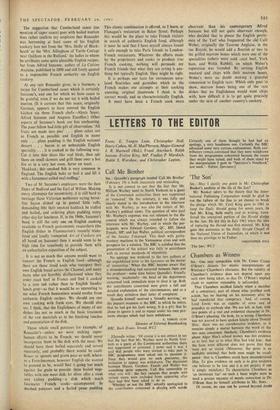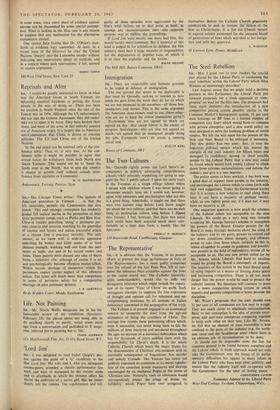Chambers as Witness
Sta.—One may sympathise with Dr. Conor Cruise O'Brien's distaste for mystic interpretations of Whittaker Chambers's character. But the validity of Chambers's evidence does not depend upon any such view being taken, so that Dr. O'Brien's implied claim to superior rationality is unfounded.
That Chambers testified falsely when a member of a conspiracy. part of whose ethic justified such action, has no bearing on his testimony after he had repudiated that conspiracy. And, of course, Lord Jowitt was as capable of error and of prejudice as anybody else. We are left, in fact, with two points of a real and evidential character in Dr. O'Brien's pleading. On both, he is wrong. Chambers was not proved to have spoken falsely about Donald Hiss: there was no corroborative evidence, so it remains simply a matter between the word of the two men concerned. Similarly, Chambers's evidence about Alger Hiss's school money was not evidence as to fact, but as to what Hiss had told him: that the facts were different does not prove that they were not so stated. (Moreover, the point is so ineffably minimal that both men might be excul- pated: that is, Chambers could have misunderstood Hiss. To give evidence on oath is to give evidence one believes to be true and it is not perjury if one is simply mistaken.) To characterise Chambers as 'an inveterate liar' on such a basis might seem to need a greater measure of mystic conviction in Dr. O'Brien than he himself attributes to Mr. Rees.
Of course, no case can be proved beyond doubt in some sense, since every piece of evidence against anyone can be discounted by some special assump- tion. What is lacking in the Hiss case is any reason to suppose that any motivation for the alternative explanation existed.
One cannot help feeling that Dr. O'Brien's stan- dards of evidence vary somewhat. At least, in a recent issue of the Observer he cited the United Nations 'inquiry' into the Lumumba murder without indicating any reservations about its methods, and in a context where such reservations, if felt, seemed to require expression.
HARRY COHEN
240 West 73rd Street. New York 23



































 Previous page
Previous page